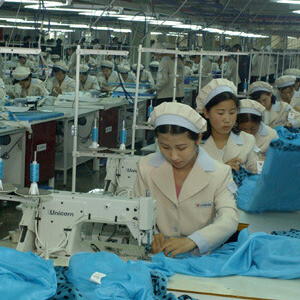hankyoreh
Links to other country sites 다른 나라 사이트 링크
Despite icy relations, South and North agree to Kaesong wage increase

North and South Korea ended six months of conflict with an agreement this week on a wage increase at the Kaesong Industrial Complex.
The agreement is noteworthy for coming at a time when inter-Korean relations are otherwise in a downward spiral, with a recent mine blast at the Demilitarized Zone prompting both sides to resume propaganda broadcasts for the first time in eleven years.
South Korea’s Kaesong Industrial District Management Committee (KIDMC) and North Korea’s Central Special Development Guidance Bureau (CSDGB) reached an agreement on Aug. 17 to raise the ㅡmonthly minimum wage of North Korean workers at the complex to US$73.873 retroactively to last March, the South Korean Unification Ministry said on Aug. 18.
In November, North Korea notified Seoul that its Supreme People’s Assembly had voted to unilaterally amend labor regulations to eliminate a previous ceiling limiting yearly minimum wage increases to 5%. Since then, it has indicated that it is raising the minimum wage by 5.18% from US$70.35 to US$74, or 0.18 percentage points more than the ceiling.
With the current agreement, however, it accepted an increase of only 5%.
Both sides appear to have achieved both practical and symbolic gains with the agreement: Seoul upheld the principle of governing the complex by consensus between the two sides, while Pyongyang benefited from a hike in social insurance premiums.
In the case of the premiums, KIDMC and CSDGB agreement on a level of 15% according to working hours, job class, job position, and job duration, representing a full acceptance of Pyongyang’s demands. Prior, the insurance premiums were calculated only according to basic salary and overtime. The resulting agreement is expected to lift the rate of increase in North Korean workers‘ real wages to the 8-10% range, or far above the 5% in minimum wage, the Corporate Association of Gaeseong Industrial Complex (CAGIC) said.
Workers at the complex currently received between US$120 and slightly over US$200 a month in pay, or roughly on par with workers in Cambodia, which has some of the lowest wages in the world. Rather than opposing a wage hike for North Korean workers outright, the South Korean side was initially rigid on the issue of the North making the decision unilaterally without consulting it.
The two sides also agreed to adjust incentives for workers according to performance and attitude toward work, and to “work toward ensuring a stable supply of workers to meet company demands.”
“The companies had been particularly interested in improving workers’ abilities and numbers, and it looks like this agreement will leave them with better operating conditions,” said a Ministry of Unification official.
The terms reached in the agreement extend until the next wage negotiations in March 2016. Other issues related to labor regulations and other system changes - as well as the complex’s “development normalization” in terms of communications, customs, and transit - are to be discussed later by the complex’s joint committee. The postponement of discussions raised questions over whether the committee will be able to reach an agreement on the issues, especially after a sixth meeting in July ultimately broke down amid acrimony between the two sides.
“The North got practical results, and the South Korean administration upheld its principles. We‘re lucky to have gotten that much,” said CAGIC chairman Chung Ki-sup.
By Kim Ji-hoon, staff reporter
Please direct questions or comments to [english@hani.co.kr]

Editorial・opinion
![[Guest essay] The real reason Korea’s new right wants to dub Rhee a founding father [Guest essay] The real reason Korea’s new right wants to dub Rhee a founding father](https://flexible.img.hani.co.kr/flexible/normal/500/300/imgdb/original/2024/0423/8317138574257878.jpg) [Guest essay] The real reason Korea’s new right wants to dub Rhee a founding father
[Guest essay] The real reason Korea’s new right wants to dub Rhee a founding father![[Column] ‘Choson’: Is it time we start referring to N. Korea in its own terms? [Column] ‘Choson’: Is it time we start referring to N. Korea in its own terms?](https://flexible.img.hani.co.kr/flexible/normal/500/300/imgdb/original/2024/0423/3617138579390322.jpg) [Column] ‘Choson’: Is it time we start referring to N. Korea in its own terms?
[Column] ‘Choson’: Is it time we start referring to N. Korea in its own terms?- [Editorial] Japan’s rewriting of history with Korea has gone too far
- [Column] The president’s questionable capacity for dialogue
- [Column] Are chaebol firms just pizza pies for families to divvy up as they please?
- [Column] Has Korea, too, crossed the Rubicon on China?
- [Correspondent’s column] In Japan’s alliance with US, echoes of its past alliances with UK
- [Editorial] Does Yoon think the Korean public is wrong?
- [Editorial] As it bolsters its alliance with US, Japan must be accountable for past
- [Guest essay] Amending the Constitution is Yoon’s key to leaving office in public’s good graces
Most viewed articles
- 1Samsung barricades office as unionized workers strike for better conditions
- 2[Editorial] Japan’s rewriting of history with Korea has gone too far
- 3[Column] The clock is ticking for Korea’s first lady
- 4[Column] The president’s questionable capacity for dialogue
- 5[Reporter’s notebook] Did playing favorites with US, Japan fail to earn Yoon a G7 summit invite?
- 6Korean government’s compromise plan for medical reform swiftly rejected by doctors
- 7Why Korea shouldn’t welcome Japan’s newly beefed up defense cooperation with US
- 8Senior doctors cut hours, prepare to resign as government refuses to scrap medical reform plan
- 9[Column] ‘Choson’: Is it time we start referring to N. Korea in its own terms?
- 10[Guest essay] The real reason Korea’s new right wants to dub Rhee a founding father